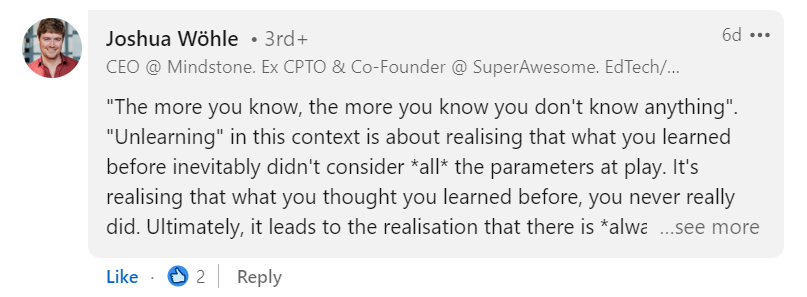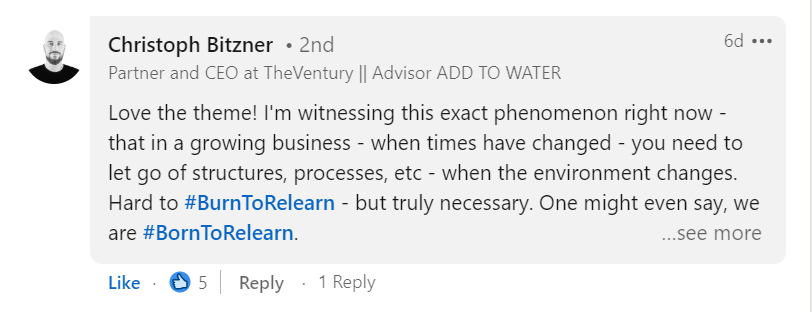The Power of “Aha!” Moments
And how they can accelerate unlearning
Before we start
One of the principles for this publication is: This is not a “one man show”.
That’s why I am going to regularly include comments and remarks from the community. The ones I included in this edition are taken from the announcement of #BurnToRelearn as the theme for PIRATE Summit 2023 that I shared last week on LinkedIn.
Thanks to everyone who has provided feedback, insights and observations. 🙏
They are super valuable as they help me to structure my thoughts around unlearning and to gain new perspectives on the topic.
Also, it will help us - the PIRATE Crew - to better shape the agenda for PIRATE Summit 2023 (btw, the Call for Content is open, and you can now propose your session.)
This edition is an exploration of some underlying thoughts and concepts of unlearning and change.
I appreciate any feedback! 😊
At a glance
Unlearning is not about forgetting or removing
There is always more to learn - and relearn
Unlearning is needed to transition from one phase to the next
Not all change is equally impactful
One Earth, but 8 billion worlds
Share your “Aha!” moment. Join the discussion on LinkedIn or reply to this mail.
Interested in joining a Telegram Group? Yes or no?
Unlearning is not about forgetting or removing
Sven doesn’t want to unlearn, as he doesn’t want to lose the value of experiences:
Just like Sven, I also don’t want to forget. Most things, at least. 😉
To me, unlearning is not about "forgetting or removing something from memory". I am not an expert, but that hardly seems achievable. In my experience, the mind is good at adding, but not at subtracting (the “don’t think of a pink elephant” exercise is a good example of this).
Unlearning is about becoming aware and accept that what once proved helpful doesn't work anymore. Once we have found acceptance, we can consciously choose an alternative model. A paradigm shift (more on that below). 👇
There is always more to learn - and relearn
Joshua notes that you can never know all the parameters:
I agree with Joshua (and Socrates 😉).
It actually touches on one of the fundamental principles in systems theory: A part of a system cannot fully explain the whole system.
Here is an example of why this is the case.
Think of your body as a complex machine with lots of moving parts - like the respiratory system, circulatory system, digestive system, and more.
These parts work together to keep you healthy and functioning, but you can't just study one part and expect to know everything about how the whole machine works.
It's like trying to figure out how a car engine works by only looking at the spark plugs - you'll get a basic idea, but you'll miss out on all the other gears, belts, and fluids that make the engine actually run.
In the same way, you need to understand all the parts of the body and how they work together to get a full picture of your health.
Plus - and now it gets way more complex - external factors like diet and exercise can impact the whole machine.
So, the more we learn about each individual system of the body, the more we understand that there is much more to learn about how the body functions as a whole and how it responds to various external factors.
Unlearning is needed to transition from one phase to the next
Christoph is experiencing the need to unlearn, first hand. Every entrepreneur can probably relate:
Each company stage (idea, startup, scaleup, maturity) requires a different focus and consequently new structures and skills.
Simplified: In startup stage, you are looking for product-market fit. The focus is on building the right thing (what to do), not (yet) on doing it well. In scaleup stage, you focus on becoming more efficient (how to do it). It requires implementing processes, scaling operations, and accommodating new employees and customers.
Especially, the transitions - from one stage to the next - are hard. They require not only to regularly #BurnToRelearn as founders, but from everybody in the organization. This will impact procedures and structures, but even more so requires a shift in behavior and attitudes.
How and on which level the change is implemented can make a big difference on the impact it has.
That’s a perfect transition to… 👇
Not all change is equally impactful
Simonetta describes the need to be aware of unhelpful behavior to choose a better one:
This encompasses very well what unlearning is all about: Change and transformation.
When I read the comment, I immediately had to think of one of the models that proved very insightful for me in my early days of understanding and working with change in a business context.
The model is super trivial, but it stuck with me ever since I encountered it in 2006.
I have no idea who came up with it. Let’s call it the “Impact of Change” model. Here it is.
Most organizations - when they talk about change - talk about changing methods or making changes to the organization (restructuring departments, changing job descriptions, redesigning processes).
If you really want to have a high impact, you got to change people’s behavior and attitude. And that’s actually pretty hard and often uncomfortable (I’ll save diving into this for a later edition).
That’s change on a business level.
There is one lever - predominantly on a personal level - that has an even greater impact - a quantum improvement if you will:
The “Aha!” moment (aka the paradigm shift).
One Earth, but 8 billion worlds
We all think we see the world from an objective angle. With so many diverging views, it’s very unlikely we have the objective one.
I’d argue that we don’t see everything as it is, but as we are. Every time we describe the world, we are describing ourselves, our perceptions, our paradigms.
In essence, there is one earth, but 8 billion worlds.
I tweeted something related last summer.
Once we really understand this, it becomes clear that the most effective way people change is through “Aha!” moments, or paradigm shifts.
Simply said, a change in perception.
The paradigm shift holds tremendous power as it is often fairly effortless and happens nearly spontaneous.
It’s a fast track to unlearning.
A paradigm shift can happen through a combination of new information, self-reflection, social influence, emotional impact, or intellectual challenge.
The most impactful triggers, though, are often life-altering events (such as divorce, illness, death of a loved one etc.).
Whilst trying to change our attitudes or behaviors can take a long time and is often cumbersome, shifting our perception can lead to a (near) spontaneous change.
It could be seen as something like this:
The perceptions are the roots on which our attitudes, beliefs and behaviors are build.
If we change our perceptions (the roots and the trunk of the tree), different attitudes, beliefs and behaviors (the branches) will emerge which consequently influence our actions (the leafs).
The birth of my son (my first child) was such a paradigm shift for me. The moment I looked him in the eye, something fundamentally changed for me and - more importantly - in me.
Essentially, a paradigm shift changes how we see the world.
It can often happen on a personal level. However, it happens for society at large as well.
Copernicus created a paradigm shift by placing the sun at the center of our planetary system. (Well, he didn’t actually place it there, but you get what I mean.)
In the field of physics, the shift from classical physics to quantum mechanics was a paradigm shift. This change brought about a completely different understanding of the behavior of matter and energy.
Technological advancements often enable paradigm shifts. The internet or smartphones being some of the more popular examples.
The rise of AI technologies - which have recently gained widespread attention through tools like ChatGPT - will most likely lead to a paradigm shift. Most probably way beyond just changing how businesses operate and interact with customers.
Each paradigm shift holds the possibility for progress, new ways to solve problems, and personal growth.
In the end, it depends on what we make of it and whether we are ready to #BurnToRelearn. 🔥
If we are, we can increase the number of paradigm shifts in our lives and thus the ways we see the world.
Share your “Aha!” experience
If you have read this far: THANK YOU! 🙏
Let’s engage. I would love to know about your “Aha!” moments:
What were the paradigm shift moments (the “Aha!” moments) that happened in your personal or professional life? How did these moments change your perception?
Answer by replying by mail or in a comment on LinkedIn.
I read every answer and would love to share some of them in one of the next editions.
Telegram Group?
I was thinking that it might be valuable to start a Telegram group with people that care about Making Business More Human.
Something cozy with high signal and little noise. Interested?
Next week, I’ll share the PIRATE Summit 2022 recap video with you. I think you'll like it!
Be safe, be healthy, and be kind. 🙏🏽
Manuel









